|
|
|
Sort Order |
|
|
|
Items / Page
|
|
|
|
|
|
|
| Srl | Item |
| 1 |
ID:
193494


|
|
|
| 2 |
ID:
193490
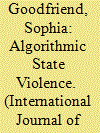

|
|
|
|
|
| Summary/Abstract |
This article provides an ethnographic account of automated surveillance technologies' impact in the occupied West Bank, taking Blue Wolf—a biometric identification system deployed by the Israeli army—as a case study. Interviews with Palestinian residents of Hebron subjected to intensive surveillance, a senior Israeli general turned biometric start-up founder, and testimonies from veterans tasked with building up Blue Wolf's database provide a rare view into the uneven texture of life under algorithmic surveillance. Their narratives reveal how automated surveillance systems function as a form of state-sponsored terror. As a globalized information economy intersects with the eliminatory aims of Israeli settler colonialism in Hebron, new surveillance technologies erode Palestinian social life while allowing technocratic settlers to recast the violence of occupation as an opportunity for capital investment and growth. Attending to the texture of life under algorithmic surveillance in Hebron ultimately reorients theories of accumulation and dispossession in the digital age away from purely economistic framings. Instead, I foreground the violent political imperatives that drive innovations in surveillance, in Palestine and worldwide.
|
|
|
|
|
|
|
|
|
|
|
|
|
|
|
|
| 3 |
ID:
193491
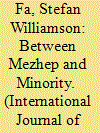

|
|
|
|
|
| Summary/Abstract |
Despite the growth in scholarship on diverse religious communities in Turkey, little attention has been paid to Twelver Shiʿi Muslims. Since the founding of the Republic, the Turkish state's foundational secularist agenda has attempted to control and promote a single hegemonic form of Islam, and Shiʿa have faced continuous issues practicing their faith in public as a result. While the liberalization of the past three decades has allowed Shiʿism to enter the public sphere, the community has had to continue navigating limitations on their expression of religious difference. Based on fieldwork in Eastern Anatolia, this article deepens understandings of Islam in Turkey by showing how Shiʿa have negotiated their position vis-à-vis both secularist and Sunni-majority actors and policies across various religious and political currents. Rejecting categorization as either mezhep (sect) or minority, Shiʿa have demanded independence from state religious control while also asserting their allegiance to the Republic and nation as Turkish Muslims.
|
|
|
|
|
|
|
|
|
|
|
|
|
|
|
|
| 4 |
ID:
193498
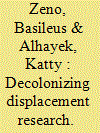

|
|
|
|
|
| Summary/Abstract |
Over the past decade, there have been increasing numbers of displaced scholars from the Middle East and Africa who have come under sustained pressures and threats from their governments; only a few of them have been able to relocate to European and North American academia through scholarships and grants.1 Even these temporary solutions for displaced scholars rarely result in sustainable institutional solidarity in the form of permanent teaching or professorial positions. The lack of institutional support, coupled with discriminatory and racialized immigration policies, pushes these few fortunate scholars to either accept exploitative conditions perpetuated by the neoliberal economy or leave academia altogether to support their families. These challenges, along with draconian economic sanctions and restrictions imposed by the US Treasury Department Office of Foreign Assets Control (OFAC) on citizens of countries such as Syria, Sudan, Iran, and Cuba are only a snapshot of what displaced scholars endure on a daily basis while trying to do research, care for their families, and compete with scholars with privileged citizenship status for shrinking opportunities in the academic job market.
|
|
|
|
|
|
|
|
|
|
|
|
|
|
|
|
| 5 |
ID:
193495


|
|
|
|
|
| Summary/Abstract |
A third wave of autocratization is manifest today.1 Universities are no exception to the institutions that are affected by democratic backsliding in a given country: according to the Varieties of Democracy (V-Dem) project, academic freedom has declined by 13 percent in autocratizing countries in the 2010–20 period, whereas almost no change has been recorded in other countries.
|
|
|
|
|
|
|
|
|
|
|
|
|
|
|
|
| 6 |
ID:
193497
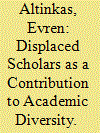

|
|
|
|
|
| Summary/Abstract |
Academic diversity has been an important consideration in hiring processes within academia since the late 2010s. The term diversity encompasses race, ethnicity, gender, religion, sexual orientation, geographical representation, and political beliefs. There are three significant considerations during the hiring process. To put it simply: “equity is the promotion of fairness and justice for each individual that considers historical, social, systemic, and structural issues that impact experience and individual needs; diversity is a measure of representation within a community or population that includes identity, background, lived experience, culture, and many more; and inclusion is the creation of an environment where everyone shares a sense of belonging, is treated with respect, and is able to fully participate.”
|
|
|
|
|
|
|
|
|
|
|
|
|
|
|
|
| 7 |
ID:
193496


|
|
|
|
|
| Summary/Abstract |
The dinner I was invited to was held after the monthly meeting of the Kayseri Chamber of Industry on a pleasant summer night in 2015. The spacious dining hall on the top floor of the chamber headquarters was filled by over a hundred industrialists from large and small companies. Kayseri's nationally celebrated cuisine was lavishly represented on our table. I was in a good mood because I had been looking forward to this opportunity for the previous two years. This meeting, and especially the part closed to the press, would hopefully give me many insights into the relations among the members of the chamber.
|
|
|
|
|
|
|
|
|
|
|
|
|
|
|
|
| 8 |
ID:
193489
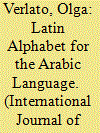

|
|
|
|
|
| Summary/Abstract |
This article explores early attempts to romanize the Arabic language in late nineteenth and early twentieth-century Egypt and situates them within a global history of script reforms in the modern period. I focus on the models to write Arabic in the Latin script developed by the Cairo-based magazine al-Muqtataf between 1889 and 1897 (which, to the extent of my knowledge, have never been examined before), relating them to the responses they elicited from the magazine's readers and some of the romanization practices found in advertising, commercial displays in the streets, and governance at the time. I demonstrate that, in this period, romanized Arabic was envisioned as an original way to pursue financial profit and technological efficiency, confront European knowledge production, and redefine the standing of Arabic within transregional publishing networks that encompassed different languages and alphabets. This analysis thus offers an alternative geography of script reform that supersedes the national framework.
|
|
|
|
|
|
|
|
|
|
|
|
|
|
|
|
| 9 |
ID:
193492


|
|
|
|
|
| Summary/Abstract |
One summer afternoon in Tbilisi, my friends Elizbari and Malkhazi, both native Tbilisians, and I bought some beer from a local store near Malkhazi's home in the hillside residential Tbilisi neighborhood of K'rts’anisi. For various reasons I can no longer recall, it would not do for us to drink in his home, so we randomly chose a deserted spot nearby: a patch of gravel next to a decrepit building with a large fallen tree, which afforded us a place to sit. Malkhazi surveyed our abject drinking spot, raised his beer in a heroic pose, and proclaimed: “Ortach'alis baghshi mnakhe, vina var!” (In the gardens of Ortachala see me, who I am!).1 We laughed at the absurd poetic reference. It was a famous line from a Persian-style Georgian poem by the noble romantic poet Grigol Orbeliani. It was a mukhambazi, a genre of poetry emblematic of “Old Tbilisi” city poetry associated with a nostalgic Georgian mythology of the nineteenth-century colonial city, centering on the island gardens of Ortachala, the site of drunken feasting of typical Tbilisian street peddlers called kintos (Georgian k'int’o). The stanza goes as such:
|
|
|
|
|
|
|
|
|
|
|
|
|
|
|
|
| 10 |
ID:
193493


|
|
|
|
|
| Summary/Abstract |
As I sit down to write the introduction to this IJMES roundtable on threats to academic freedom in the Middle East and the multiple consequences of these threats for scholars from and of the region, I also am reading news about proliferating restrictions in the United States. In Florida, professors are changing their courses due to prohibitions on teaching about race issued by the state's governor and legislature, and under threat of losing their jobs and livelihood if they run afoul of these restrictions. In Minnesota an adjunct art history professor was denied future teaching opportunities and called Islamophobic by her employer for exposing her students to the range of Muslim perspectives on creating images of the Prophet Muhammad. At Harvard the former head of Human Rights Watch was initially denied a fellowship, seemingly due to the organization's reporting on Israeli human rights violations. And these instances are just a small sample of the anti–academic freedom news. They serve as a reminder that threats to academic freedom are global.
|
|
|
|
|
|
|
|
|
|
|
|
|
|
|
|
| 11 |
ID:
193488


|
|
|
|
|
| Summary/Abstract |
The trajectory of the Hassan II Prize for Manuscripts, a government initiative begun in the late 1960s to locate rare manuscripts in private collections, is a potent example of the role Arabic-script manuscript culture played in post-colonial nation-building in Morocco. This article presents the history of the Hassan II Prize for Manuscripts, demonstrating how Moroccan bureaucrats used the recovery of archival documents and especially historic manuscripts in Arabic-script, as part of a multi-faceted nation-building project after European colonization. Their project included connecting historic manuscripts to Moroccan identity and territorial sovereignty. It contends that the ramifications of linking these policies with documentary heritage would affect what came to be discovered, valorized, and preserved in the “national collection” and subsequently, what histories could be written.
|
|
|
|
|
|
|
|
|
|
|
|
|
|
|
|
|
|
|
|
|